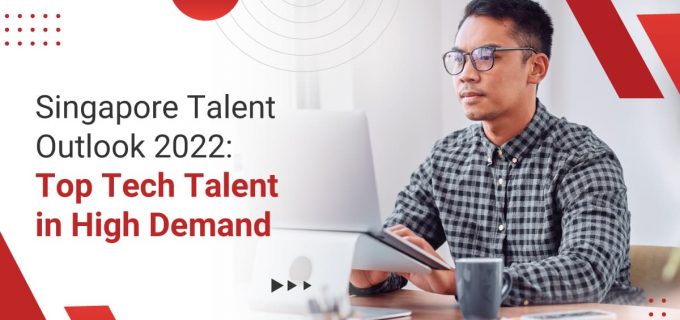In this article
2021 was an odd year for the tech industry in Singapore. On one hand, the digitisation of almost every industry was expedited as millions of Singaporeans were forced to work, shop, and live online.
On the other hand, the tech sector couldn’t attract enough talent to keep up with demand. COVID-19 is mainly responsible for both situations.
To give you an idea of how short Singapore is on tech talent, Amazon Web Services (AWS) estimates Singapore will need 1.2 million additional digital hires by 2025 to remain competitive in an increasingly digital economy. That’s more than a fifth of Singapore’s current population!
The double-edged sword of the Singapore tech industry will cut both ways for a while to come due to a range of factors. Here’s what to expect:
A Tech Industry Bursting at the Seams
The first reason for the high demand for tech talent in 2022 is that, simply put, the tech industry is growing fast, with expectations for a seamless digital experience fueled by the COVID-19 pandemic.
Singapore’s economy is increasingly reliant on digital services and internet-based businesses.
In this new economy, companies are turning to technology to boost productivity and efficiency – both of which are essential for competing in a global market.
That means it’s not just the tech industry that needs new talent. On top of 80 of the world’s top 100 tech firms having a presence in Singapore, every other industry is feeling the pressure to digitise.
To stay afloat, these businesses need teams of technology experts to help them with everything from website design to big data analysis.
In addition, tech investments from around the world are also pouring in, and tech giants headquartered in Singapore like Sea and Grab also require skilled talent in this field for their business operations.
A Lack of Local Talent
Singapore’s local talent pool is lacking, so apart from grooming local leaders, it also has to attract foreign talent, all while managing its tight labour market.
Only about one-third of the Singapore tech workforce is local, and the remainder comprises foreign professionals. With closed borders, it’s been difficult for Singapore to attract the best global talent.
Singapore’s Immigration Efforts to Bring in Foreign Talent
Thankfully, over the past year, Singapore has been progressively easing its border measures, which helps in bringing foreign talent into our city.
The government has also been ramping up its efforts to position the city-state as a global hub for talent. It has implemented work permit schemes like the Personalised Employment Pass (PEP), the brilliant Tech.Pass, and the new Overseas Networks and Expertise Pass (ONE) to attract the top global talent.
The ONE pass has garnered plenty of attention, especially with its criterion of a S$30,000 fixed monthly salary for applicants and its tempting work flexibility benefits.
Pass holders are also exempt from the Fair Consideration Framework (FCF) job advertising requirement and the upcoming COMPASS framework.
Local Programmes to Enhance and Build Talents
In Budget 2022, the government also introduced the Singapore Global Executive Programme (SGE), a custom programme that backs chosen local businesses in a few ways, including curating a career development journey.
Under this programme, it partners with these local enterprises to let young Singaporean talents seize growth opportunities.
Another programme that promotes local talent development is the SkillsFuture Leadership Development Initiative (LDI) that endeavours to create the next generation of business leaders.
A Focus on Education and Women in Tech
If Singapore is to make a dent here, a massive focus also must be put on education, both public and private. JP Morgan’s one-year Singapore internship comes to mind as a way of bringing in graduates, as well as those wishing to switch careers.
There is also a need for more women to take up tech. Only 41% of females questioned in a study of 600 STEM students intended to pursue jobs in the field, compared to 69% of males. That needs to change.
Work From Home or Back to the Office?
72% of executives in Singapore (versus 59% globally) say their business will create hybrid working models even after the pandemic.
That means working from home or hybrid working is no longer a perk; it’s a bare minimum for a workforce that can afford to be picky.
If there is still a Singaporean stigma of presenteeism — a feeling that one is not actually working if they’re not in the office — is bound to delete itself in the not-too-distant future.
That means we can expect a rise in co-working spaces and flexi-office arrangements as businesses try to appeal to the best talent.
Tech Hub Investments
The Singapore Government has been trying its utmost to position itself as an international talent hub. The Punggol Digital District (PDD) in Singapore is the perfect example of the government’s efforts to attract top-tier tech talent to the country.
The hub is a new, state-of-the-art facility that will serve as a centre for research and development, innovation, and entrepreneurship in the digital sector.
Boston Dynamics, Wanxiang, Delta Electronics, and Group-IB have already signed up to be part of Singapore’s first "smart business district", and PDD will in time, create 2,000 tech jobs for Singapore.
Compared to the 1.2 million jobs we need to create however, Singapore itself might need to be one big smart business district.
The Great Talent Migration in Tech
Job interviews for tech talent are about to get a lot easier. With unprecedented demand for top talent, companies are no longer just looking for the best and the brightest.
They’re also willing to consider those with less experience if the talent is there.
Expect to see thousands of tech professionals migrate within their field, or more likely, to an adjacent field in 2022 — a whopping 96% of tech talent would switch disciplines if offered the chance.
So, for example, medical records technicians might become health information managers, and data entry clerks could become business intelligence analysts.
To its credit, Singapore is in a prime position to take advantage of this migration, with its strong economy, bilingual workforce, and welcoming immigration policies. Singapore has always been a country that’s open to new ideas and new people, and its tech sector is no different.
In the coming years, Singapore’s tech sector will see unprecedented demand for top talent. Public and private initiatives will do their best to fill the gap, but whether it will be enough, remains to be seen.
FAQs
We’ll help you with your Singapore work visa applications
Trust our immigration professionals to secure your best talent in Singapore





